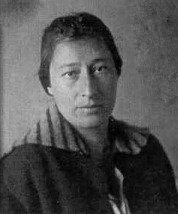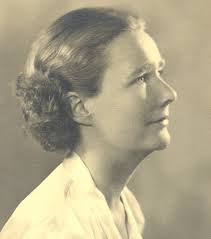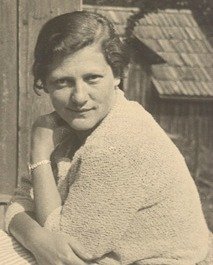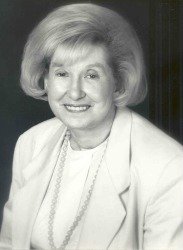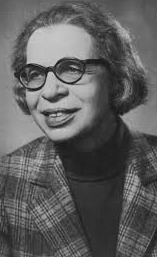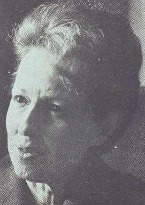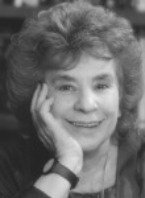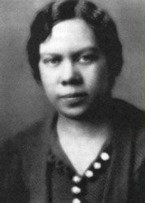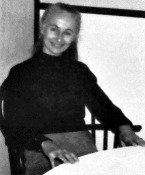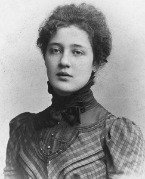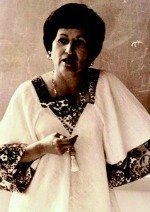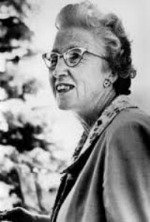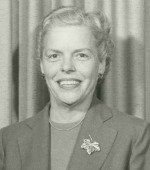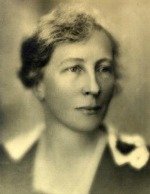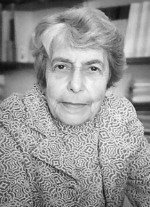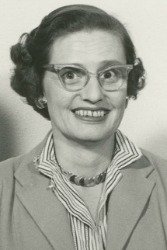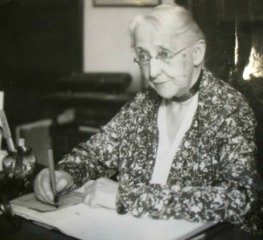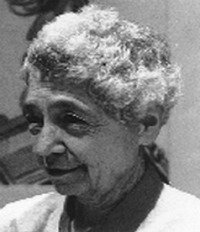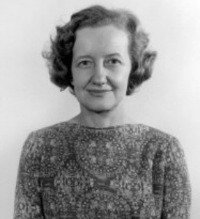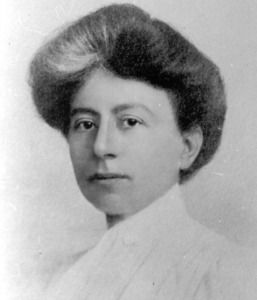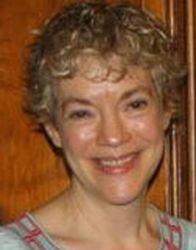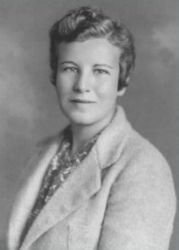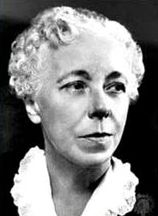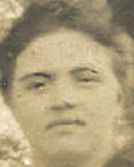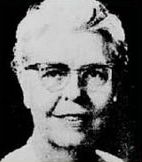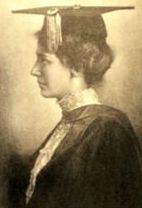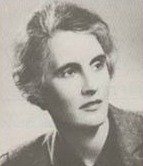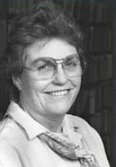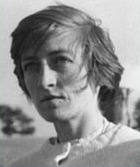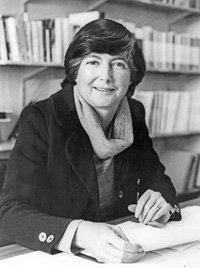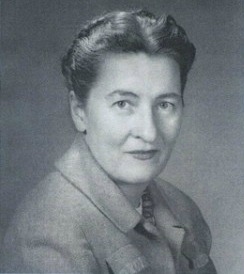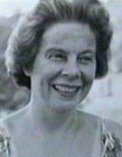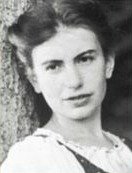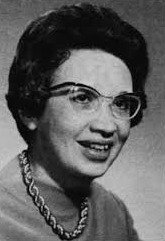Women in Psychology
All-About-Psychology.Com presents a showcase of some of the most eminent women in the history of psychology. Many thanks to Dr. Michelle Lee for the inspiration.
This women in psychology T-Shirt is available from Amazon (prime eligible) in a range of colors. Sales help support this website, which has been providing free and comprehensive information and resources for psychology students and educators since 2008.
Mathilde Hertz
An eminent biologist and sensory physiologist, Mathilde Hertz was also a pioneer in the field of comparative psychology whose work in this area helped establish the psychological study of animal behavior as a distinct field of research. During a short but very productive career Hertz published over thirty articles, the most influential of which drew upon Gestalt principles in the study of animal perception.
Molly Harrower
A pioneering clinical psychologist, Molly Harrower spent the early part of her career working alongside Kurt Koffka where she was immersed in the field of experimental Gestalt psychology, publishing several influential articles on color perception.
Marie Jahoda
An eminent social psychologist, Marie Jahoda conducted pioneering studies into racial prejudice, the authoritarian personality and the concept of positive mental health. Along with her first husband Paul Lazarsfeld, Jahoda also carried out groundbreaking research on the psychological impact of unemployment; culminating in 1933 with the publication of their landmark work on the subject, 'Marienthal: The Sociography of an Unemployed Community,' a social psychology classic.
In 1979 Marie Jahoda received the American Psychological Association (APA) Award for Distinguished Contributions to Psychology in the Public Interest and in 1980 was the recipient of the prestigious (APA) Kurt Lewin Award, presented for 'outstanding contributions to the development and integration of psychological research and social action.'
Florence Denmark
A pioneering and internationally renowned teacher, author and speaker on the psychology of women, Florence Denmark has conducted groundbreaking research on a range of topics including, violence, prejudice and stereotyping, ethnicity and gender.
Among her many professional achievements, Florence Denmark was a founding member of the Association for Women in Psychology in 1969, was the American Psychological Association (APA) president in 1980, received the APA Award for Distinguished Contributions to Psychology in the Public Interest in 1992 and in recent years served as the leading representative to the United Nations for both the International Council of Psychologists and the American Psychological Association.
Elizabeth Koppitz
A pioneer in learning disabilities and special education, Elizabeth Koppitz wrote several influential books within the field of psychoeduational assessment of children; including, The Bender Gestalt Test for Young Children in 1964 and Psychological Evaluation of Children's Human Figure Drawings in 1968.
In recognition and memory of her distinguished contribution to the field, the American Psychological Foundation established the Elizabeth Munsterberg Koppitz Child Psychology Graduate Student Fellowship to support graduate research projects and scholarships in child psychology.
Bernice Levin Neugarten
A renowned authority within the field of gerontology and adult human development, Neugarten was at the forefront in the fight against ageism and the promotion of intergenerational equity. Included among her most influential publications were: 'Personality in Middle and Late Life' (1964), 'Middle Age and Aging: A Reader in Social Psychology' (1968) and 'Adjustment to Retirement. A Cross-National Study' (1969).
Ursula Bellugi
A pioneering researcher in the field of language neurobiology, Ursula Bellugi was the first to show that American Sign Language is a true language, replete with grammar and syntax which draws upon many of the same areas of the brain for processing as spoken language. Among her many career highlights, Ursula Bellugi received the American Psychological Association (APA) Award for Distinguished Scientific Contributions in 1992 and was elected to National Academy of Sciences in 2007.
Ruth Winifred Howard
The first African American woman to earn a doctorate in psychology, Ruth Winifred Howard enjoyed a very successful research and consulting career within a variety of fields including child development, family counseling, mental health training and nursing education.
Barbara Snell Dohrenwend
A highly respected figure within the interrelating fields of community psychology, health psychology, and psychological epidemiology, Dohrenwend's influential body of work on stress was driven by her firmly held conviction that scientific research should be employed to ease psychological suffering.
Melanie Klein
A founding figure within the psychoanalysis movement, Melanie Klein is best known for developing play therapy and her groundbreaking theories on the emotional development of children; in particular the concept of the 'paranoid-schizoid position' and the 'depressive position.'
Rosa Katz
A pioneering developmental psychologist, Katz is best known for her classic work 'Gespräche mit Kindern' (Conversations With Children) which she wrote with David Katz. The book was the result of an extensively recorded account of over 150 conversations Rosa and David Katz had with children in the course of one year (1925-1926) and is considered a landmark publication within the field of pedagogical psychology.
Martha Bernal
In 1962 Martha Bernal earned a doctoral degree in clinical psychology from Indiana University and in doing so became the first woman of Mexican descent to receive a PhD in psychology in the USA. During the course of a very successful career Bernal made a telling contribution to several areas of research, including human psychophysiology, Latino psychology and minority mental health issues.
Leona Tyler
A highly respected psychology teacher, researcher and writer, Leona Tyler was renowned for her work on individual differences; most notably through her influential book 'The Psychology of Human Differences,' first published in 1947. In 1973 Tyler served as president of the American Psychological Association and among the many honors she received during a long and distinguished career, Tyler was awarded the prestigious Gold Medal for Life Contribution by a Psychologist in the Public Interest by the American Psychological Foundation in 1990.
Helen Peak
A highly respected scholar and pioneering researcher, Helen Peak was among the first group of psychologists to undertake precise laboratory measurements during social behavior experiments. Peak was also renowned for helping to bring together social psychology and individual psychology through her innovative work on attitude structure and attitude change.
Lillian Moller Gilbreth
A pioneer in the field of industrial and organizational psychology, Lillian Gilbreth introduced the concept of the time and motion study as a business efficiency and productivity technique. During her remarkable career, Gilbreth became the first female member of the Society of Industrial Engineers and the first woman to receive the Hoover Medal for distinguished public service by an engineer. Gilbreth's legacy was also acknowledged in 1984 when the United States Postal Service issued a stamp in Gilbreth's honor as part of their Great Americans series.
Tamara Dembo
A highly respected researcher who made significant contributions within experimental, social and Gestalt psychology, Tamara Dembo is best known for her work on anger and frustration among children and for conducting innovative research into the impact of physical disability and disfiguration from the perspective of those affected. This pioneering research project culminated in the publication of 'Adjustment to Misfortune' in 1956, a hugely influential paper which was one of the very first studies within the burgeoning field of rehabilitation psychology.
Pauline Snedden Sears
A pioneer in the study of child development, Sears conducted groundbreaking research into self-esteem and motivation among children. Sears is also renowned for her widely cited work on career aspiration and life satisfaction among intellectually gifted women which formed part of the famous longitudinal study of gifted children which Lewis Terman initiated at Stanford in 1922. In 1980, Pauline Snedden Sears received the American Psychological Foundation Gold Medal in recognition of her distinguished record of scientific and scholarly accomplishments
Lillien Jane Martin
A highly respected academic, Lillien Martin began her career in the psychology department at Stanford University in 1899. Martin not only conducted influential research in psychophysics and aesthetics but also became a pioneering expert in the field of gerontology. In 1929 Martin founded the Old Age Center, the first ever counseling center established for senior citizens.
Mary Henle
A highly respected figure within the field of Gestalt psychology, Mary Henle developed the first laboratory manual on the subject in 1948 and conducted influential empirical research within a range of topic areas including; perception, motivation, rationality, problem solving and the relationship between thinking and logic. In recognition of a long and distinguished career, Henle was featured in the prestigious publication, American Men and Women of Science in 1978.
Brenda Langford Milner
A world renowned pioneer in the field of neuropsychology, Brenda Milner began her illustrious career in the early 1950's exploring the effects of temporal lobe damage in humans, for her Ph.D. under the supervision of Dr. Donald Hebb.
In 1957 along with William Scoville, Milner published 'Loss of Recent Memory After Bilateral Hippocampal Lesions.' This classic article included the findings of a series of experiments conducted with H.M (Henry Molaison) who famously was unable to commit new events to long-term memory following radical surgery designed to control his severe epileptic seizures. This groundbreaking research found that HM was able to steadily improve his performance on tests which he had no recollection of ever taking, a stunning discovery which provided compelling evidence that the brain is not as previously thought, governed by a solitary memory system. This landmark paper would go on to be one of the most cited publications in the history of neuroscience.
Among her many professional accolades, Brenda Milner received the American Psychological Association (APA) Distinguished Scientific Contribution Award in 1973 and was inducted into The Canadian Medical Hall of Fame in 1997.
Margaret Floy Washburn
An eminent psychologist, teacher and researcher, Margaet Floy Washburn completed her graduate training at Cornell University under the supervision of Edward B. Titchener in 1894 and in doing so became the first woman in the United States to be awarded a Ph.D. in Psychology. Renowned for her work on the study of consciousness and the examination of mental processes in animals and humans, Washburn served as president of the American Psychological Association in 1921 and was elected to the National Academy of Sciences in 1931.
Tracy Seedman Kendler
A leading experimental psychologist, Kendler is best known for her influential theory of developmental changes in discrimination shift learning which she first outlined in detail in the classic Psychological Review article 'Vertical and Horizontal Processes in Problem Solving,' published in 1963. A distinguished and pioneering researcher Tracy Seedman Kendler was one of the first female members of the Society of Experimental Psychology and was the first woman elected to the governing board of the Psychonomic Society.
Susan Tufts Fiske
Professor of Psychology and Public Affairs at Princeton University, Susan Tufts Fiske is internationally renowned for her groundbreaking research into the causal nature of stereotyping, prejudice, and discrimination.
A profoundly influential expert in her field, Professor Fiske's testimony was central to a landmark decision on gender bias by The U.S. Supreme Court in 1989 and she was also called to testify before President Clinton’s Race Initiative Advisory Board in 1998. Among her many academic honors, Professor Fiske received the American Psychological Association (APA) Distinguished Scientific Contribution Award in 2010 and was elected to the National Academy of Sciences in 2013.
Alice Bryan
Renowned for unceasing efforts in tackling the marginalization of women in psychology, Alice Bryan founded the National Council of Women Psychologists in 1940 and coauthored a series of influential studies issued under the title, 'Women in American Psychology' between 1944 and 1947. A passionate advocate of mentoring, Bryan stated that 'One of my deepest satisfactions has been the appointment to professional positions of four women who were my students while earning their doctoral degrees.'
Karen Horney
An eminent psychoanalytic theorist and pioneer within the field of the psychology of women, Karen Horney wrote widely on the androcentric (male centered) nature of orthodox Freudian thinking and psychology in general. In addition to her contribution to feminine psychology, the influence of Horney's innovative and groundbreaking personality theories spread far and wide; for instance, her views on the potential for human growth were followed with great interest by the likes of Abraham Maslow and Carl Rogers. A truly original thinker, Karen Horney's ideas helped inform an eclectic mix of areas within mainstream psychology.
Norma Estelle Cutts
A pioneer in the provision of school psychological services in the United States, Norma Cutts' landmark publication in 1943 "How to Use Psychological Service in the Schools, A Guide to the Technique and Interpretation of the Individual Psychological Examination" was instrumental in establishing standards for training, certification, and practice.
Throughout the course of a long and distinguished career, Cutts wrote widely on a range of topics within an educational context, including, mental hygiene, discipline and intellectual giftedness. In a tribute to Norma Cutts published shortly after her death aged 96 in 1988, Thomas K. Fagan noted that "her friendship and contributions through most of American psychology's first century will be felt well into its next."
Nancy Bayley
A pioneering figure in the field of developmental psychology, Nancy Bayley is best known for the longitudinal Growth Study she conducted during her time at the University of California, Berkeley, which among other things helped establish standards of physical, motor and behavioral development.
In 1966 Bayley became the first woman to receive the American Psychological Association (APA) Award for Distinguished Scientific Contributions. Also in recognition of a long and illustrious career, Bayley received the G. Stanley Hall Award for Distinguished Contributions to Developmental Psychology in 1971 and in 1982 the American Psychological Foundation Gold Medal award for her outstanding life's work in the behavioral sciences.
Naomi Norsworthy
A pioneer in the field of childhood mental testing and mental deficiency, Naomi Norsworthy was the first woman to graduate with a Ph.D in psychology at Columbia University. An outstanding teacher and innovative researcher Naomi Norsworthy died in 1916 aged just 39.
Her most influential work The Psychology of Childhood was published posthumously in by her friend and colleague Mary Theodora Whitley in 1918. That same year a book celebrating the life and work of Naomi Norsworthy was published in which the then Dean of Teachers College, Columbia University, James E. Russell noted that "She met every advance more than halfway, and she gave unstintingly of herself to all who sought her aid. This ability to reach out to the other person, to interpret another’s need, and to give sympathetic assistance from a rich store of scholarly attainments was what made her a great teacher."
Lois Meek Stolz
A pioneer in the field of childhood education and development, Lois Stolz served as the first president of the National Association of Nursery Education in 1929 and as the first woman to chair the Committee for the National Society for the Study of Education oversaw a landmark publication on Preschool and Parental Education; which proved instrumental in stimulating interest and groundbreaking research within child development.
In the course of a long and distinguished academic career, Stolz worked as a research associate at the Institute of Child Welfare at the University of California at Berkeley before joining the faculty of psychology at Stanford University in 1944 where she remained until her retirement in 1957. A highly respected author, 'Your Child’s Development and Guidance' published in 1940 is widely cited as Lois Meek Stolz's most important publication.
Nadine Lambert
A renowned researcher within educational settings, Nadine Lambert was the founder of the University of California, Berkeley's doctoral program in school psychology and served as director of this innovative program from 1965 until 2004.
The recipient of many honors in the course of an esteemed career, Lambert received the Distinguished Professional Contributions Award from the American Psychological Association (APA) in 1986 in recognition that her 'research on the social and the psychological antecedents of various childhood and adolescent mental health problems, as well as her work with hyperactive children, has contributed significantly to the improved treatment and understanding of many childhood and adolescent behavioral problems.'
In 1998 the National Association of School Psychologists named Nadine Lambert a 'Living Legend,' and in 2005, she was awarded the APA Division 16 Senior Scientist Award for long-standing and exceptional contributions to the science of school psychology.
Dorothea Jameson
Dorothea Jameson conducted pioneering research on the bidirectionality of color perception. In 1972 Jameson received the American Psychological Association (APA) Distinguished Scientific Contribution Award, the award citation read:
'The research team of Dorothea Jameson and Leo Hurvich has significantly advanced our knowledge of color vision through a broadly based program of conceptually sophisticated and rigorously conducted experiments. Their research has provided basic data which are essential to theory and at the same time provide a quantitative framework for physiological investigations. Their very unusual scholarship, technical skill, untiring motivation, and contagious enthusiasm for scientific discovery have set new standards of excellence against which future experimenters and theorists will be judged.'
One of the world's leading authorities on color theory and optics, Jameson was elected to the National Academy of Sciences in 1975.
Jacqueline Jarrett Goodnow
A pioneering researcher in the field of cognitive development, Jacqueline Goodnow is best known for her work on two-choice learning and the influence of culture on thinking. Goodnow is also renowned for her innovative accounts of childhood cognition exemplified in her influential book 'Children Drawing' published in 1977.
Reflecting on her work, Goodnow stated 'My interests have consistently been in the goals and expectations that people bring to any task or problem, the strategies they use to achieve their aims, and their perception of the risks and benefits of various strategies.' As a result of pursuing these interests over the course of a long and distinguished career, Jacqueline Goodnow achieved international recognition for helping to establish the investigative potential of cognitive science within psychology.
Mary Ainsworth
A hugely influential developmental psychologist, mary Ainsworth is best known for her career-long research partnership with John Bowlby and her pioneering work on child developmental psychopathology. Among her many professional honors, Ainsworth received the American Psychological Association Award for Distinguished Scientific Contributions in 1989 and the American Psychological Foundation Gold Medal Award for Life Achievement in the Science of Psychology in 1998, the official citation for which read:
'Mary Ainsworth stands out as one of the major figures of the twentieth century in the study of the relations between young children and their care-givers. Her work on the nature and development of human security, her exquisite naturalistic observations of attachment—care-giving interactions, her conceptual analyses of attachment, exploration and self-reliance, and her contributions to methodology of infant assessment are cornerstones of modern attachment theory and research. The patterns of attachment that she identified have proven robust in research across diverse cultures and across the human lifespan. Her contributions to developmental psychology, developmental psychopathology, and ultimately to clinical psychology, as well as her teaching, colleagueship, and grace, are the secure base from which future generations of students can explore.'
Marian Breland Bailey
A renowned behaviorist, Marian Bailey was one of B.F. Skinner's first graduate students at the University of Minnesota and one of the first applied animal psychologists to utilize operant conditioning.
Among Bailey's best known academic contributions was the classic article 'The Misbehavior of Organisms,' first published in American Psychologist in 1961. The article caused a storm among the behaviorist community when the authors stated that: 'After 14 years of continuous conditioning and observation of thousands of animals, it is our reluctant conclusion that the behavior of any species cannot be adequately understood, predicted, or controlled without knowledge of its instinctive patterns, evolutionary history, and ecological niche.'
Anna Freud
The youngest of Sigmund Freud's six children and a renowned psychoanalyst in her own right, Anna Freud is widely considered one of the most influential founders of psychoanalytic child psychology. Among her best known work was 'Beating Fantasies and Daydreams,' a paper she presented to the Vienna Psychoanalytical Society in 1922 and her landmark books, 'The Ego and the Mechanisms of Defense' first published in 1936 and 'Normality and Pathology in Childhood' published in 1965.
Arguably Anna Freud's most enduring legacy concerned the difficulties experienced by emotionally deprived and disadvantaged children. An article about the impact of her work for the BBC noted that she 'revolutionised how we treat children in many walks of life, such as in hospital - with longer visiting hours when children are having treatment - and in the judicial system, where screens and video cameras are used when children have to give evidence.'
Oliva M. Espin
Professor Emerita in the Department of Women’s Studies at San Diego State University and the California School of Professional Psychology of Alliant International University, Dr. Espin is renowned for her pioneering contribution to the psychology of women and gender.
Among her numerous honors, Oliva M. Espin received the Psychological Association Award for Distinguished Professional Contributions in 1991 in recognition 'for her efforts to advance cross-cultural communication, gender issues, human sexuality, international awareness, and cultural factors as critical elements in the knowledge base of psychology.'
Anne Anastasi
A hugely influential figure in the field of differential psychology, Anne Anastasi is renowned for her pioneering research into the way traits are influenced by heredity and environment. Anne Anastasi is also famed for her outstanding scholarship, writing a series of classic books including 'Psychological Testing.' First published in 1954 and now in its 7th edition Psychological Testing is heralded by the American Psychological Association (APA) 'as one of the most important psychology texts of the twentieth century.'
In the course of a long and distinguished career, over thirty years of which were spent at Fordham University; Anne Anastasi served as president of the APA in 1972 and received the American Psychological Foundation's gold medal for lifetime achievement in 1984.
Gail Wyatt
Professor in the Department of Psychiatry and Biobehavioral Sciences at the University of California, Los Angeles (UCLA), Dr. Wyatt was the first African-American woman to be licensed as a psychologist in the state of California. A pioneering and influential researcher, Dr. Wyatt has testified on numerous occasions before the United States Congress in relation to health policy issues.
In 1992, Gail Wyatt received the American Psychological Association Award for Distinguished Contribution to Research in Public Policy, part of the official citation for which read: 'Her research significantly advanced our understanding of the effects of abortion, childhood sexual abuse, sexual assault, sexually transmitted diseases, and sexual practices among women, particularly African-American women, and establishing research methods and tools to create culturally appropriate measures of these critical issues.'
Recent Articles
-
Tourettes: Understanding Tourette Syndrome Beyond Stereotypes
Feb 23, 26 06:01 AM
Learn what tourettes really is, why swearing is a myth for most, and how education reduces stigma around Tourette syndrome. -
Psychological Impact of Catastrophic Injury & Recovery
Feb 17, 26 02:26 AM
Explore the psychological impact of catastrophic injury, including trauma, identity shifts, resilience, and long-term mental health recovery. -
Psychology Articles by David Webb
Feb 10, 26 06:31 AM
Discover psychology articles by David Webb, featuring science-based insights into why we think, feel, and behave the way we do.
Please help support this website by visiting the All About Psychology Amazon Store to check out an awesome collection of psychology books, gifts and T-shirts.
Go To The Psychology Pioneers Page


